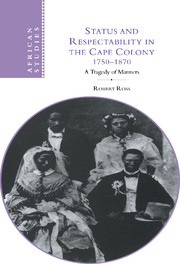
-
Select format
-
- Publisher:
- Cambridge University Press
- Publication date:
- July 2009
- July 1999
- ISBN:
- 9780511497292
- 9780521621229
- 9780521121255
- Dimensions:
- (228 x 152 mm)
- Weight & Pages:
- 0.485kg, 220 Pages
- Dimensions:
- (229 x 152 mm)
- Weight & Pages:
- 0.33kg, 220 Pages
- Series:
- African Studies (98)
Book description
In a compelling example of the cultural history of South Africa, Robert Ross offers a subtle and wide-ranging study of status and respectability in the colonial Cape between 1750 and 1850. His 1999 book describes the symbolism of dress, emblems, architecture, food, language, and polite conventions, paying particular attention to domestic relationships, gender, education and religion, and analyses the values and the modes of thinking current in different strata of the society. He argues that these cultural factors were related to high political developments in the Cape, and offers a rich account of the changes in social identity that accompanied the transition from Dutch to British overrule, and of the development of white racism and of ideologies of resistance to white domination. The result is a uniquely nuanced account of a colonial society.
Reviews
Review of the hardback:‘There are many valuable insights in this subtle book, often with major historiographical implications … Ross has produced a bold and original book, which mixes mature reflection with fresh creative enthusiasm. He has confirmed his status as one of the leading historians of the eighteenth- and nineteenth-century Cape.’
Source: The Times Literary Supplement
Contents
Metrics
Altmetric attention score
Full text views
Full text views help Loading metrics...
Loading metrics...
* Views captured on Cambridge Core between #date#. This data will be updated every 24 hours.
Usage data cannot currently be displayed.
Accessibility standard: Unknown
Why this information is here
This section outlines the accessibility features of this content - including support for screen readers, full keyboard navigation and high-contrast display options. This may not be relevant for you.
Accessibility Information
Accessibility compliance for the PDF of this book is currently unknown and may be updated in the future.


